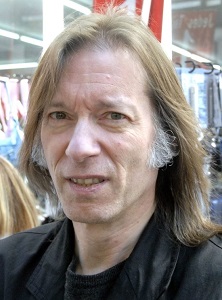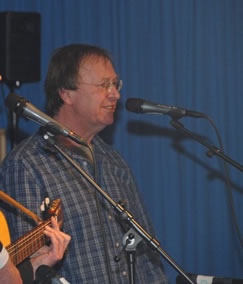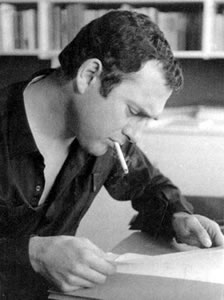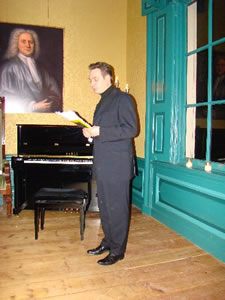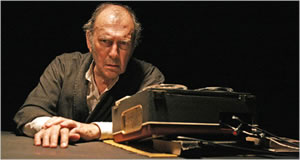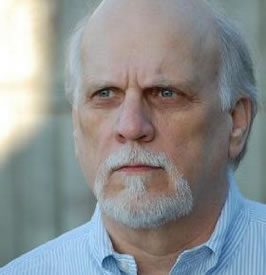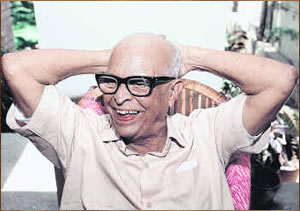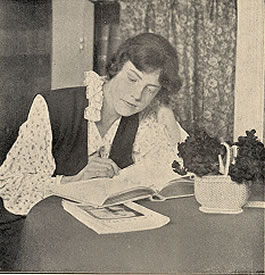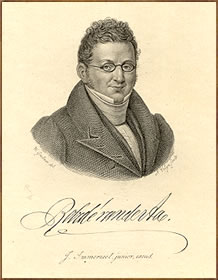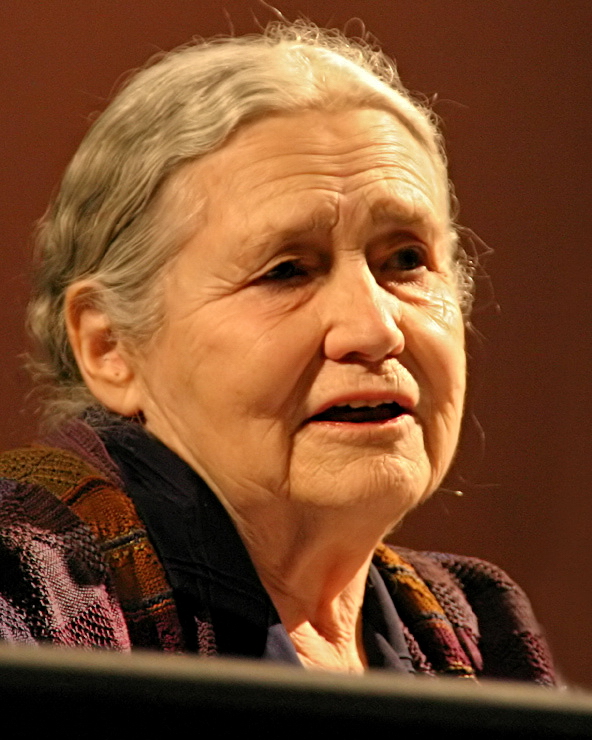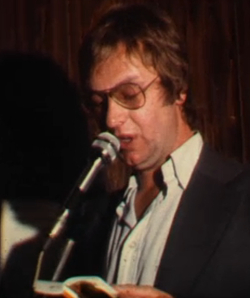De Nederlandse schrijver, cabaretier en televisiepresentator Arjen Lubach werd geboren in Lutjegast op 22 oktober 1979. Zie ook alle tags voor Arjen Lubach op dit blog.
Uit: IV
“Ze lachte, pakte hem vast en zei: ‘Ik vraag aan mijn vader of we in het huis kunnen, goed?’ Nu ze hier een week zijn, ziet hij haar rustig worden. Haar schouders staan iets minder hoog, haar oogleden lijken minder zwaar. Ze slaapt langer, beter. Hij ook. Elsa wordt volgende week negenentwintig. Ze was bijna klaar met haar promotieonderzoek aan de wiskundefaculteit toen ze zwanger bleek te zijn. De vakgroep was er niet blij mee, maar omdat ze had beloofd zo veel mogelijk door te werken en vooruit te werken, had ze een goede regeling weten te treffen. Ze wilden haar niet kwijt. !lij denkt aan de avond op de universiteit toen hij was meegegaan naar een afscheidsreceptie van iemand uit haar vakgroep. ‘Er zijn weinig mensen zo getalenteerd als Elsa,’ had een dronken hoogleraar in zijn oor gefluisterd. ‘Hoe zij het Vermoeden van Goldbach benadert is werkelijk mindblowing.’
Joost had alleen maar trots kunnen knikken. Hoe briljant ze ook mocht zijn, Esa was vooral zijn vriendin. En inmiddels ook de moeder van hun kind. Haar gezicht is nog rimpelloos, haar lichaam heeft zich na een paar maanden bijna volledig hersteld van de zwangerschap, alsof er niets is veranderd. Aan de andere kant van het huis stopt een auto. Een autoportier gaat open en dicht en de auto rijdt dan weer door. Joost loopt om het huis heen. De bestelwagen verdwijnt net om de hoek. Bij de voordeur ligt een papieren zak. Zoals elke dag de afgelopen week twee croissants, één baguette. Dan hoort hij Lars huilen. Als Joost om het huis is gelopen is het ineens stil. Elsa komt hem slaperig tegemoet in T-shirt en onderbroek. Zij draagt Lars in haar armen. Haar ogen zijn nog half dicht van de slaap. ‘Goedemorgen,’ zegt zij zonder volume. ‘Goedemorgen, luiaard,’ zegt hij en stapt naar binnen met het brood. Elsa loopt het terras op, neemt plaats op een van de ligstoelen. Joost ziet haar zitten door het raam. Hij ziet de zon op haar lijf, haar hand om het hoofdje van Lars. Vanaf de zee waait een zachte wind. Ze sluit kon haar ogen. Wat zullen we gaan doen vandaag?’ vraagt Joost als hij weer buiten staat met glazen sinaasappelsap op een dienblad. Waar denk je aan?’ zegt Elsa. ‘Naar een hippe strandtent? Met Franse chicks flirten?’ Joost lacht. ‘Ik weet niet. Naar een zeeaquarium? Een middeleeuws stadje?’ ‘Nee,’ zegt Elsa. Ze trekt een vies gezicht. ‘Liever niet.’ Wil je helemaal niets?’ ‘Jawel.’ Ze pakt zijn hand. ‘Dat jij straks een salade maakt_ Met noten en geitenkaas. En dat ik mijn boek uitlees. En dat het dan voor we het weten weer avond is. Dat wil ik het liefst’ Joost knijpt in haar schouderen draait zich om, klaar voor de dag die volstrekt anders Ui verlopen.”

Arjen Lubach (Lutjegast, 22 oktober 1979)
De Nederlandse dichter en schrijver Lévi Weemoedt werd geboren in Geldrop op 22 oktober 1948. Zie ook alle tags voor Lévi Weemoedt op dit blog.
Geen gezicht 1953
Al bij de oogarts wou ik niet lezen:
de allergrootste E, ik zag ‘m niet staan.
Ik wou al vroeg Foster-kindje wezen.
‘Wat staat h i e r nou?!’, schreeuwde de arts ontdaan.
De tranen drupten in m’n jongensblousje.
‘k Had allebei m’n oogjes dichtgedaan.
O! ‘k voelde dat de man nu snel ging slaan:
‘Een h o n d j e…?’, piepte ik, ‘…òf een p o e s j e?’
De klap die kwam kan ik vandaag nòg horen:
schuimbekkend vloog de arts de kamer uit,
kwam terug en schoof een lasbril op m’n oren.
Maar ditmaal zag ik s t e r r e t j e s voor de ruit!
Doch déze observatie hield ik vóór me,
en prees het zicht. Kwam thuis op het geluid.
Werksstudent
De dag viel wazig door mijn brilleglazenvet.
’t Wakkere werkvolk stommelde naar een vroeg karwei.
Ik riep de maten aan, maar zij negeerden mij.
Toch had ik net een zware vuilbak neergezet.
De lange trap op naar de boeken. Half tien.
Ik kon, met één oog dicht, vanaf mij leger,
door toedoen van een wimper ’t carillon van kleuren zien,
waarmee de zon speeld’ in het zweet van de schoorsteenveger.
Des middags dacht ik na over die dingen.
En zag dat men door lijden pas tot leven kwam.
Dit vond ik, eenzaam, in een kroeg te Amsterdam.
Schuin achter me begon een stem te zingen.
Het was de meid die daar de drank bestelde.
Ik goot mij vol om haar diepzinnig lied.
En toen zij neeg en mij de wisselstuivers telde,
drukt ik mij even, snnartlijk, aan haar rechter tiet.
En zonder eten schaatste ik huiswaarts door de goot,
door het werkverzakend leger uitgejoeld,
voor wie ik heel de dag gedacht had en gevoeld!
Men eert profeet en denker na hun dood.
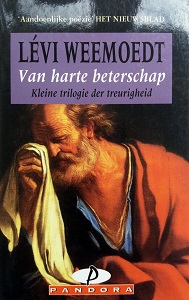
Lévi Weemoedt (Geldrop, 22 oktober 1948)
Cover
De Zwitsers-Duitse schrijver en essayist Jonas Lüscher werd geboren op 22 oktober 1976 in Zürich. Zie ook alle tags voor Jonas Lüscher op dit blog.
Uit: Frühling der Barbaren
“Preising kam also, ohne eigenes Verschulden, zu einer desolaten Firma, die ein paar tatkräftige Entscheidungen nötig gehabt hätte,und deswegen kann es als gesichert gelten, dass das Unternehmen heute nicht mehr existieren würde, hätte nicht jener junge Messtechniker Prodanovic die WolframCBC-Schaltung entwickelt und die Zügel in die Hand genommen. Prodanovic war demnach nicht nur dafür verantwortlich, dass Preising mittlerweile vermögender Besitzer, sondern auch Vorstandsvorsitzender einer Gesellschaft mit tausendfünfhundert Angestellten und Niederlassungen auf fünf Kontinenten war. Zumindest nach außen hin, denn das operative Geschäft des dynamischen Unternehmens, welches nun den dynamischen Namen Prixxing trug, führte längst Prodanovic, zusammen mit einer Riege entschlussfreudiger Leistungsträger und Wertschöpfer. Preising aber war als Gesicht der Firma noch immer gefragt, denn Prodanovic wusste, wenn Preising etwas konnte, dann war es, Beständigkeit zu vermitteln, den unerschütterlichen Geist eines Familienunternehmens in der vierten Generation. Das war das Einzige, was Prodanovic, der Sohn eines bosnischen Buffetkellners, sich nicht zutraute, da er selbst der Meinung war, das Balkanhafte sei die Verkörperung der Instabilität, die es um jeden Preis als Eindruck zu vermeiden galt. Prodanovic hielt, wenn es ihm sein dicht gedrängter Kalender erlaubte, gerne kleine Vorträge an städtischen Problemschulen, wo er als Beispiel gelungener Integrationauftrat.JenerProdanovicalso,dervolleProkurabesaß, hatte Preising in die Ferien geschickt. Etwas, was er regelmäßig tat, wenn wichtige Entscheidungen anstanden.”

Jonas Lüscher (Zürich, 22 oktober 1976)
De Britse schrijster Doris Lessing werd geboren in Kermanshah, Perzië op 22 oktober 1919. Zie ook alle tags voor Doris Lessing op dit blog.
Uit: The Sweetest Dream
“An early evening in autumn, and the street below was a scene of small yellow lights that suggested intimacy, and people already bundled up for winter. Behind her the room was filling with a chilly dark, but nothing could dismay her: she was floating, as high as a summer cloud, as happy as a child who had just learned to walk. The reason for this uncharacteristic lightness of heart was a telegram from her former husband, Johnny Lennox – Comrade Johnny – three days ago. SIGNED CONTRACT FOR FIDEL FILM ALL ARREARS AND CURRENT PAYMENT TO YOU SUNDAY.
Today was Sunday. The ‘all arrears’ had been due, she knew, to something like the fever of elation she was feeling now: there was no question of his paying ‘all’ which by now must amount to so much money she no longer bothered to keep an account. But he surely must be expecting a really big sum to sound so confident. Here a little breeze – apprehension? – did reach her. Confidence was his – no, she must not say stock-in -trade, even if she had often in her life felt that, but could she remember him ever being outfaced by circumstances, even discomfited?
On a desk behind her two letters lay side by side, like a lesson in life’s improbable but so frequent dramatic juxtapositions. One offered her a part in a play. Frances Lennox was a minor, steady, reliable actress, and had never been asked for anything more. This part was in a brilliant new play, a two-hander, and the male part would be taken by Tony Wilde who until now had seemed so far above her she would never have had the ambition to think of her name and his side by side on a poster. And he had asked for her to be offered the part. Two years ago they had been in the same play, she as usual in a serviceable smaller role. At the end of a short run – the play had not been a success – she had heard on the closing night as they tripped back and forth taking curtain calls, ‘Well done, that was very good.’
Smiles from Olympus, she had thought that, while knowing he had shown signs of being interested in her. But now she had been watching herself burst into all kinds of feverish dreams, not exactly taking herself by surprise, since she knew only too well how battened down she was, how well under control was her erotic self, but she could not prevent herself imagining her talent for fun (she supposed she still had it?) even for reckless enjoyment, being given room, while at the same time showing what she could do on the stage, if given a chance. But she would not be earning much money, in a small theatre, with a play that was a gamble. Without that telegram from Johnny she could not have afforded to say yes.”
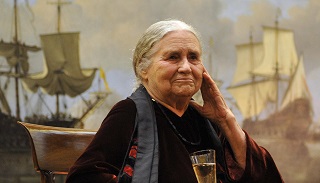
Doris Lessing (22 oktober 1919 – 17 november 2013)
De Engelse dichter en schrijver Alfred Douglas werd geboren in Ham Hill in Worcestershire op 22 oktober 1870. Zie ook alle tags voor Alfred Douglas op dit blog.
Rejected (Fragment)
And He hid my soul at last
In a place of stones and (ears,
Where the hours like days went past
And the days went by like years.
And after many days
That which had slept awoke,
And desire burnt in a blaze,
And my soul went up in the smoke.
And we crept away from the place
And would not look behind,
And the angel that hides his face
Was crouched on the neck of the wind.
And I went to the shrine in the hollow
Where the lutes and the flutes were playing,
And cried : ‘ I am come, Apollo,
Back to thy shrine, from my straying.’
But he would have none of my soul
That was stained with blood and with tears,
That had lain in the earth like a mole,
In the place of great stones and fears.
And now I am lost in the mist
Of the things that can never be,
For I will have none of Christ
And Apollo will none of me.
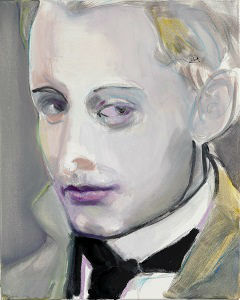
Alfred Douglas (22 oktober 1870 – 20 maart 1945)
Portret door Marlene Dumas, 2016
De Schotse schrijfster Alison Louise Kennedy werd geboren op 22 oktober 1965 in Dundee. Zie ook alle tags voor A. L. Kennedy op dit blog.
Uit: Serious Sweet
“It was traditional to hate foxes, but she wasn’t sure why. She guessed it was a habit to do with guilt. They always sounded injured, if not tormented, and that could get you thinking about harms you’d done to others in your past. The foxes perhaps acted like a form of haunting by offering reminders of sin, and that was never popular. Or perhaps there was no logic involved, only free-form loathing, picking a target and sticking with it.
She enjoyed the warm din of the foxes, the bloody-and-furry and white-toothed sound—it was intense, and she appreciated intensity. This was her choice. In the same way, the Hill was her choice. The open dark had given her a cliff-top feeling as soon as she came within sight of the big skyline. It provided the good illusion that she could step off from here and go kicking into space, swimming on and up. Below her, opened and spread, were instants and chains of light apparently hung in a vast nowhere, a beautiful confusion. It was easy to assume that London’s walls and structures had proved superfluous, been let go, and that only lives, pure lives, were burning in midair, floating as stacks of heat, or color, perhaps expressions of will. What might be supporting the lives, you couldn’t tell.
Then, during the course of an hour, the sun had indeed pressed in at the east, risen, birds had woken and announced the fact, as had airplanes and buses, and the world had solidified and shut her back out. It was like a person. You meet someone at night and they won’t be the same as they will if you see them in daytime. Under the still-goldenish, powdery sky, buildings had become just buildings, recognizably Victorian in the foreground and repeating to form busy furrows, their pattern interrupted where bombs had fallen in the war. These explosive absences had then been filled with newer and usually uglier structures, or else parks. There were also areas simply left gapped. They had been damaged and then abandoned, allowed to become tiny wildernesses, gaps of forgotten cause. Rockets had hit in ’44—V-1s and V-2s. Somewhere under the current library—which wasn’t council anymore—there’d been a shattered building and people in pieces, dozens of human beings torn away from life in their lunch hour. It didn’t show. There was a memorial plaque if you noticed, but other human beings, not obviously in pieces, would generally walk past it and give it no thought.”
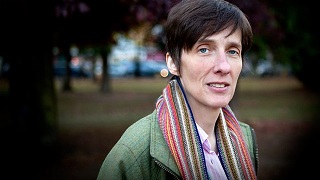
A. L. Kennedy (Dundee, 22 oktober 1965)
De Franse dichter en schrijver Charles Marie René Leconte de Lisle werd geboren op 22 oktober 1818 op het eiland Réunion. Zie voor ook alle tags voor Charles Leconte de Lisle op dit blog.
Hèraklès solaire
Dompteur à peine né, qui tuais dans tes langes
Les Dragons de la Nuit ! Cœur-de-Lion ! Guerrier,
Qui perças l’Hydre antique au souffle meurtrier
Dans la livide horreur des brumes et des fanges,
Et qui, sous ton œil clair, vis jadis tournoyer
Les Centaures cabrés au bord des précipices !
Le plus beau, le meilleur, l’aîné des Dieux propices !
Roi purificateur, qui faisais en marchant
Jaillir sur les sommets le feu des sacrifices,
Comme autant de flambeaux, d’orient au couchant !
Ton carquois d’or est vide, et l’Ombre te réclame.
Salut, Gloire-de-l’Air ! Tu déchires en vain,
De tes poings convulsifs d’où ruisselle la flamme,
Les nuages sanglants de ton bûcher divin,
Et dans un tourbillon de pourpre tu rends l’âme !
La résurrection d’Adonis
L’aurore désirée, ô filles de Byblos,
A déployé les plis de son riche péplos !
Ses yeux étincelants versent des pierreries
Sur la pente des monts et les molles prairies,
Et, dans l’azur céleste où sont assis les dieux,
Elle rit, et son vol, d’un souffle harmonieux,
Met une écume rose aux flots clairs de l’Oronte.
Ô vierges, hâtez-vous ! Mêlez d’une main prompte,
Parmi vos longs cheveux d’or fluide et léger,
Le myrte et le jasmin aux fleurs de l’oranger,
Et, dans l’urne d’agate et le creux térébinthe,
Le vin blanc de Sicile au vin noir de Korinthe.
Ô nouveau-nés du jour, par mobiles essaims,
Effleurez, papillons, la neige de leurs seins !
Colombes, baignez-les des perles de vos ailes !
Rugissez, ô lions ! Bondissez, ô gazelles !
Vous, ô lampes d’onyx, vives d’un feu changeant,
Parfumez le parvis où sur son lit d’argent
Adonis est couché, le front ceint d’anémones !
Et toi, cher Adonis, le plus beau des daimones,
Que l’ombre du Hadès enveloppait en vain,
Bien-aimé d’Aphrodite, ô jeune homme divin,
Qui sommeillais hier dans les champs d’asphodèles !
Adonis, qu’ont pleuré tant de larmes fidèles
Depuis l’heure fatale où le noir sanglier
Fleurit de ton cher sang les ronces du hallier !
Bienheureux Adonis, en leurs douces caresses
Les vierges de Byblos t’enlacent de leurs tresses !
Éveille-toi, souris à la clarté des cieux,
Bois le miel de leur bouche et l’amour de leurs yeux !
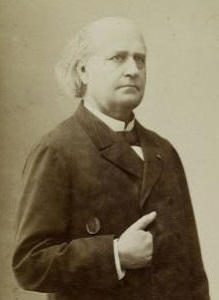
Charles Leconte de Lisle (22 oktober 1818 – 18 juli 1894)
De Russische schrijver en dichter Ivan Aleksejevitsj Boenin werd geboren in Voronezj op 22 oktober 1870. Zie ook alle tags voor Ivan Boenin op dit blog.
As in a boundless sea in darkening fields and meadows
As in a boundless sea in darkening fields and meadows
The sunset’s tristful rays fade and then sink from sight,
And in mute twilights wake, over the steppe the shadows
Creep swiftly, bringing night.
Soft sound the gophers’ calls, and, ne’er the stillness waking,
Jerboas now appear – two or perhaps just one.
They ghost-like haunt the plain, great leaps across it taking,
And all at once are gone…
Youth
A whip cracks in the wood, and cattle low
And through the underbrush are heard to
Crash heavily. Leaves rustle. Snowdrops show
Their blue heads here and there. A sudden, furtive
Wind starts to blow, and ashen clouds are swept
Across the skies, a cool, fresh rain presaging…
The heart grieves and is glad that life is, strangely,
Vast like the steppe and empty like the steppe.
In den Alpen
Am Gipfel, in die schneebedeckten Höhen
Schnitt meine Messerklinge ein Sonett.
Vielleicht ist, wo die Tage schnell vergehen,
Einsam meine Spur noch nicht verweht.
Am Gipfel, wo der Himmel blauer leuchtet,
Wo’s Winterlicht sich freudenvoll ergeht,
Sah nur allein die Sonne, wie’s Stilett
In den smaragdnen Schnee den Vers gezeichnet.
Mich freut es, wenn der Dichter mich versteht;
Wenn auch die Masse tief im Tal, im Seichten,
Ein solches Werk niemals in Rausch versetzt …
Am Gipfel, wo der Himmel blauer leuchtet,
Schnitt ich zur Abendstunde ein Sonett
Für jene, die auch solche Höhn erreichten.
Vertaald door Eric Boerner
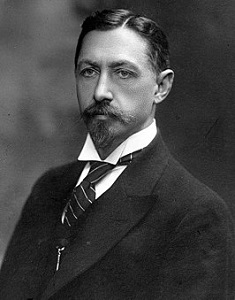
Ivan Boenin (22 oktober 1870 – 8 november 1953)
Onafhankelijk van geboortedata
De Duitse schrijver en journalist Timur Vermes werd geboren in 1967 in Neurenberg. Zie ook alle tags voor Timur Vermes op dit blog.
Uit: Die Hungrigen und die Satten
“Der Flüchtling versucht betont normal zu gehen, was nicht leicht ist, weil es sich nicht normal anfühlt. Ob sein Gang so natürlicher wird, kann er noch nicht sagen. Er weiß nur, dass das Normalgehen auch deshalb nicht klappt, weil ihn die Blicke der anderen nervös machen. Er zieht daraufhin den Kopf etwas ein, aber das ist der falsche Weg, das merkt er gleich an den Reaktionen: Wahrscheinlich sieht er jetzt aus wie ein buckliger Storch. Dann lieber Brust raus, Kopf hoch und grinsen.
Besser.
Er muss nur aufpassen, dass er nicht anfängt, huldvoll zu grüßen wie die alte Engländerkönigin. Hätte er es früher tun sollen? Ging eigentlich nicht. Es ist ja nicht so, dass er ewig darüber nachgedacht hat. Er ist auch jetzt noch nicht sicher, ob es richtig war. Ändern kann er es auf jeden Fall nicht mehr.
Er entspannt sich langsam, das Grinsen wird zu einem Lächeln. Er lässt sich allmählich in seine neue Rolle fallen. Ist ja logisch dass sie ihn ansehen. Wie sollte es auch anders sein: Wenn jeder Tag genauso ist wie der Tag zuvor, dann werden kleinste Veränderungen aufregend. Interessant ist, dass sein sichereres Auftreten andere Reaktionen hervorruft. Es wird weniger gekichert, und er bekommt öfter ein aufinunterndes Nicken oder Anerkennung. Zwei Kinder laufen ihm hinterher, so wie sie manchmal Autos nachlaufen. Es könnten noch mehr werden, aber dann kommt tatsächlich ein Auto, und seine Staubwolke reißt die Kinder mit sich fort.
Der Flüchtling beginnt mit der neuen Situation zu spielen. Ein Mädchen sieht ihn an, und er antwortet auf ihren Blick mit einem Tanzschritt. Sie lacht. Es fühlt sich gut an. Es war richtig. Es war’s wert. Er kitte es wohl doch früher tun sollen. Der Flüchtling biegt um die Ecke und sieht Mahmoud. Mahmoud hockt auf dein Boden und beobachtet eine Gruppe von Mädchen. Der Flüchtling schiebt die Hände in die Hosentaschen und stellt sich neben Mahmoud.
Mahmoud bewegt sich nicht.
»Das bringt nix«, sagt der Flüchtling zu ihm.
»Das weiß man nicht«, meint Mahmoud, ohne aufzublicken.
»Das weiß man. Du guckst falsch.«
»Ich guck, wie alle gucken.«
»Eben«, sagt er.
»Alle gucken zu Nayla, alle gucken wie du. Woran soll sie merken, dass du besonders bist?«
»Weil es gar nicht um Nayla geht.«
»Sondern? Um Elani?«
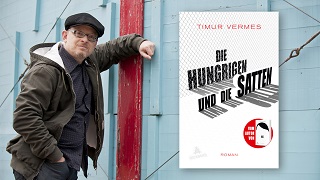
Timur Vermes (Neurenberg, 1967)



